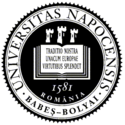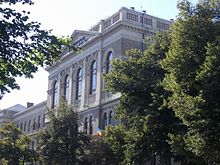Babes Bolyai University of Cluj
| Babes Bolyai University of Cluj | |
|---|---|

|
|
| founding | 1776 German-speaking 1872 Hungarian-speaking 1919 Romanian -speaking |
| place | Cluj-Napoca , Romania |
| Rector | Ioan-Aurel Pop |
| Students | > 45,000 (Feb. 2006) |
| Employee | 1,700 (2006) |
| Networks | Network of Balkan Universities |
| Website | www.ubbcluj.ro |
The Babeş-Bolyai University Cluj ( Romanian Universitatea Babeş-Bolyai ) is located in the Romanian city of Cluj-Napoca ( German Klausenburg ) in Transylvania . It was named after the Romanian medic Victor Babeş (1854-1926) and the Hungarian mathematician János Bolyai (1802-1860). It is the only trilingual university in southeastern Europe. The university has three fields of study, which are taught in Romanian, Hungarian and German.
history
The first attempts to found a university in Transylvania were made by Prince Sigismund around 1567 when he expressed his wish for a university in Sebeş .
István Báthory then laid the foundations for the opening of further universities in other parts of the country ( Pressburg , Ofen and Tyrnau ) and a college in Cluj in 1581. The first rector of this college was the Italian Antonio Possevino. The college was run by the Jesuits , but later closed again.
In the course of the Counter Reformation , the Catholics founded an academy in Cluj in 1688, again under the control of the Jesuits.
Maria Theresa founded a German-speaking university in Kolozsvár in 1776, but it was soon replaced by Joseph II with the famous Piarist college , where classes were held in Latin.
After 1848 the call for a university in the national language became louder. The Romanians asked for a university with Romanian as the language of instruction. The Hungarian Minister Loránd Eötvös proposed the establishment of a university with the teaching languages Romanian, Hungarian and German in order to take account of the increased multilingualism in Transylvania. This proposal was supported by the Romanian elite. However, the university was founded in 1872 with the exclusive language of instruction Hungarian, which outraged the Romanians and excluded them from university education.
After the Hungarian loss of Transylvania to Romania as a result of the First World War , the university was converted into a Romanian university on October 1, 1919 and first into the University of Upper Dacia (Romanian Universitatea Daciei Superioare ), then later into King Ferdinand University (Romanian Universitatea " Rule Ferdinand I ” ) renamed.
In the course of the territorial reorganization of 1940, the Romanian University moved to Sibiu and Timișoara and the Hungarian University from Szeged to Cluj. In 1945 the Romanian University moved back to Cluj and has been named after Victor Babes ever since . In addition, the Romanian government founded a Hungarian university under the name of János Bolyai .
In 1959, these two universities were merged to form the Babeş-Bolyai University of Cluj . The Babeş Bolyai University now taught in Romanian and Hungarian. Under the Ceaușescu regime , however, the Hungarian share was massively reduced.
Construction of a new campus began in 1996 and new student residences were built in 1999.
The Babeș-Bolyai University is in the process of being integrated into the international system of universities, which among other things has made it one of the most important universities in Central and Eastern Europe in the creation of modern communication systems and the connection to European university networks ( GÉANT ) to become expresses.
The international profile of the university is guaranteed primarily through extensive cooperation with other universities, which also includes the exchange of professors and other academic staff. In the 2005/2006 academic year, 11 faculties offered 13 Bachelor and three Master programs in German.
Faculties
Today's university has 21 faculties in the fields of mathematics and computer science, physics, chemistry and chemical engineering, geography, biology and geology, philology, law, political, administrative and communication science, European studies, history and philosophy, psychology and education, sociology and social work , Physical education and sport, economics, business, environmental studies and theology (Orthodox, Greek Catholic, Roman Catholic, Reformed), theater and television.
Partnerships
The Babes Bolyai University is a member of the network of Balkan universities and also works with the following German-speaking universities:
- University of Graz
- University of Vienna
- University of Bremen
- Bremerhaven University of Applied Sciences
- Chemnitz University of Technology
- Chur University of Technology and Economics
- Friedrich-Alexander University Erlangen-Nuremberg
- Research Center Karlsruhe (KIT)
- University of Innsbruck (geography)
- University of Leipzig
- University of Applied Sciences Merseburg
- Schmalkalden University of Applied Sciences
- Carl von Ossietzky University of Oldenburg
- University of Applied Sciences Mittweida (FH)
- Westfälische Wilhelms-Universität Münster (double diploma course in Political Science European Studies)
- University of Potsdam
- University of Regensburg
- Rostock University
- University of Salzburg
- Eberhard Karls University of Tübingen
- Julius Maximilians University of Würzburg
- University of Trier
literature
- Robert Offner: The medical knowledge exchange between Transylvania and other European countries as reflected in the study abroad and the medical training of Transylvanians before the establishment of the University of Cluj (1872). In: Reports on the history of science. Volume 24, Issue 3, Weinheim 2001.
Web links
Individual evidence
- ↑ Florian Kührer-Wielach : Transylvania without Transylvanians? State integration and new offers of identification between regionalism and national unitary dogma in the discourse of the Transylvanian Romanians. 1918–1933 (= Southeast European Works , Volume 153), de Gruyter, Berlin / Munich / Oldenburg / Vienna 2014, ISBN 978-3-11-037890-0 (Dissertation on Doctor of Philosophy (Dr. Phil.) University of Vienna 2013, 419 pages, 25 cm, full text online PDF, free of charge, 421 pages, 206 MB).
- ^ Conference of the Balkan Universities May 2010 in Edirne ( Memento of August 9, 2011 in the Internet Archive )

